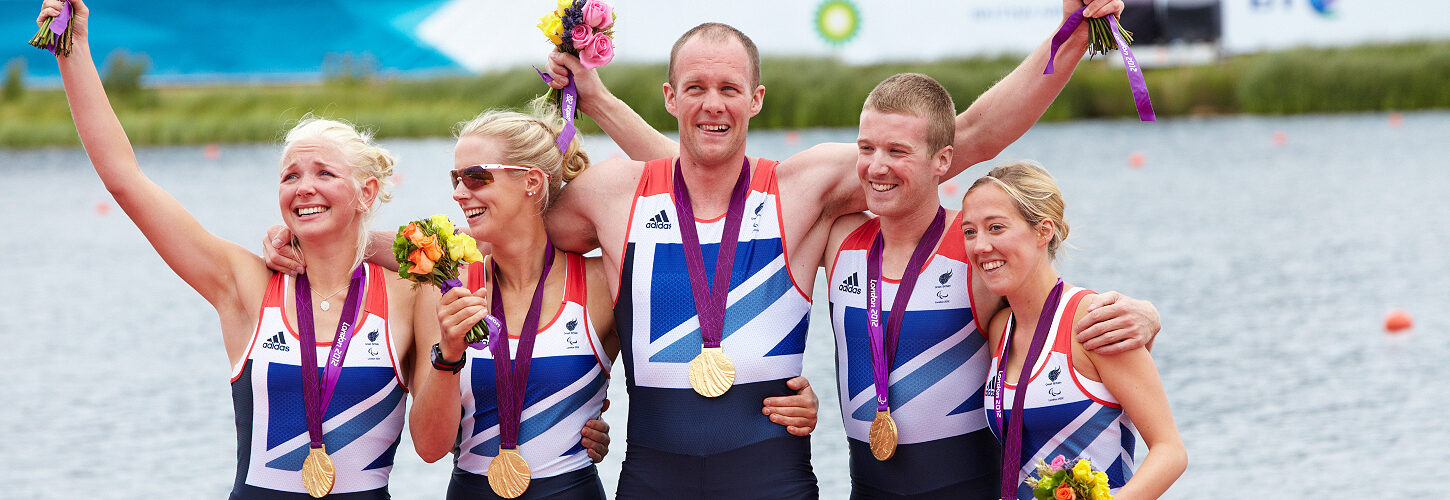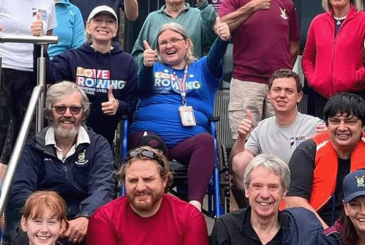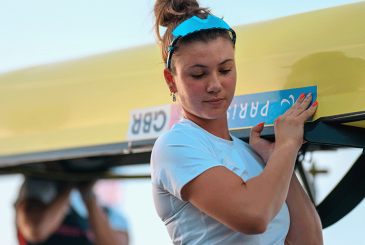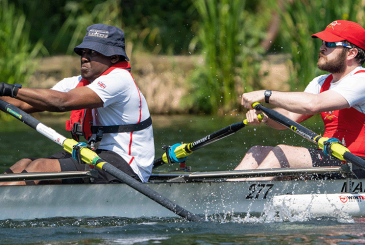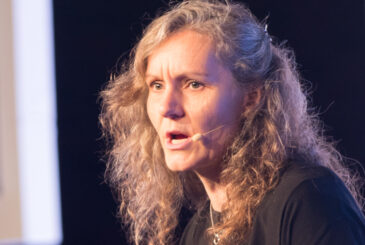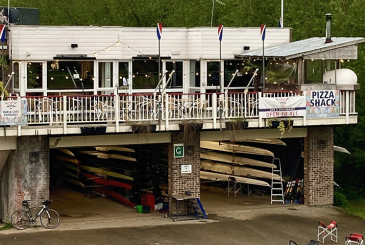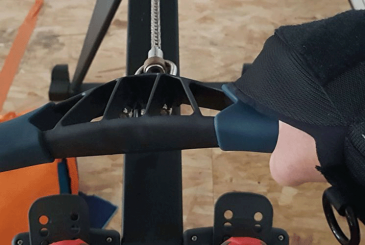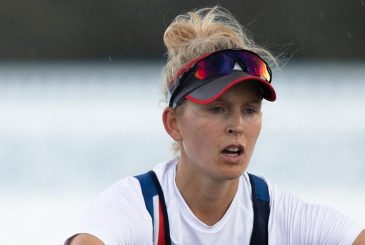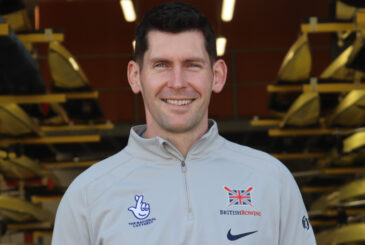In our second iconic Paralympic final, Martin Cross talks to double Paralympic champion Pam Relph, revisiting the London 2012 mixed coxed four showdown at Eton Dorney
The London Paralympics was an amazing celebration of sport and changed the way that people viewed disabled sport, perhaps for ever. One of Britain’s key hopes for gold in those Games was the mixed coxed four. Pam Relph won a hard-fought selection battle to sit in the bow seat of that boat. Together with her crew, she had to put her body on the line in an effort to beat her opposition in London, particularly the German four. Things did not always go well for the British boat.
Read on to hear Pam’s journey into rowing and how she competed on the greatest stage of all at the Paralympic Games…
“I wasn’t always going to be a rower. I joined the army when I was 16, as I was trying to become an engineering officer in the Royal Engineers. So, I joined the military and went through their selection process, and just prior to attending Sandhurst for officer training I was medically discharged because of my psoriatic arthritis, which is my condition that I classified with for the Paralympics.
I was diagnosed with psoriatic arthritis when I was about six or seven – most people think arthritis is like bones rubbing against each other. That is the degenerative kind of arthritis that you get maybe when you’re later in life, but my arthritis is an auto-immune condition causing my body to create a lot of inflammation in my joints. I’ve had degeneration and damage that’s predominantly in my right wrist, but also in other joints in my body. It limits my range of motion and strength in my right hand to about 20% which is what classified me for the Paralympics.
When I got into rowing in 2010, my sister Monica was then in the under-23 team. When Monica was a junior athlete, she was coached by Mary McLachlan, who now coached the mixed coxed four boat in the Paralympic rowing team and Mary was always looking for new Para-athletes. Monica connected the two of us together. After classifying, the coaches told me that if I trained really hard, then I might get a shot at going to the Paralympics, which was going to be in London. That was a golden ticket! You can’t say no to that. So, I did exactly that; trained my butt off and got in the boat.
I raced my first World Championships in Bled in 2011 and though we won that race, we all had to fight for our seats again to make the crew for London 2012. I was seat raced at the Gavirate International Paralympic Regatta which was our first regatta of the season. At the time, I was pretty annoyed about having to seat race, but they have to put people under pressure and give everyone a fair shot. The boat went quicker with me in the bow seat, and I was pleased to have secured my spot for the 2012 boat.
The coaches decided to put the women in the bows of the boat (the PR3 category is a mixed gender boat class) because we needed an attacking, robust rhythm and at the time, Naomi [Riches] and I were both not physical enough to do that. So, Dave [Smith] and James [Roe] were in the stern with Lily Van Den Broecke coxing.
Our key opposition for the Paralympics was the German crew. They were big and strong and punchy and scary. That’s what we focused on when we were training: how do we beat the Germans? It was a case of knowing that they could do times that scared us. We would break a world best time and then they would go out and break it again.
We did our pre-Games camp in Banyoles, which happened during the London Olympics. We had a big screen set up and after dinner every night, we would go back and watch the Olympic competitions that happened that day. We were training during the day, so nobody was allowed to look at their phones to find out the results. It was exciting seeing the crews win medals that we’d trained alongside at Caversham.
“We would break a world best time and then they would go out and break it again”
It was a hard camp. Our crew were fighting different injury issues with certain members of the crew, so we took what we got and went fast when we could. We had to just be really careful because not only are we ‘pro’ athletes and prone to injury anyway, but we had different disabilities and different people reacting to the training stress. During that camp we were top of the percentages with Tom [Aggar] in the single scull.
For the Paralympics, we stayed at the micro village in Royal Holloway. As a four, we gelled together. We had each other’s backs and I’m not embarrassed to say that it was definitely something that I have never found again, with any other crew. I’ve been in great crews after London 2012, but that crew was really special.
We won our opening heat pretty easily, and it was a couple of hours apart from the Germans racing in the other heat. They had some really fast conditions, and they broke the world’s best time, so it definitely made us nervous ahead of the final.
The morning of the final, I remember feeling really nervous when I woke up. James Roe was in the room over the hall from me, and he knocked on my door and said: ‘My heart rate is really elevated, maybe I’m ill?’.
We would take our heart rate every morning and if your heart rate elevated, it’s an indication that you could be coming down with an illness or overload or whatever. It made me laugh so much – even if he was ill, there would be nothing that we could do about it! Regardless of whether or not he was on death’s door, he would be racing. Of course, he wasn’t ill. He was just really nervous – like the rest of us were.
We got to the course and did our pre-paddle, then loosened up for the final and just before we boated for the race, we heard the results from Tom’s race. It was not what anyone was expecting. Tom was odds-on favourite to get a gold medal, but he did not have the race he was expecting, coming in fourth. He was the golden boy going into it, and we knew that we were up there with him on percentages in the lead into the Games. All of a sudden, we felt a lot more pressure on ourselves – now we HAD to do it for the whole team because it was GB’s last chance of a Paralympic rowing medal.
We boated for our warm-up, and as we got through that bridge (the point at which you are not allowed to return back to the dock), something was clunking on the boat. We realised that there were some loose bolts, and our cox didn’t bring her rigger-jigger with her because she didn’t want even an ounce of extra weight in the boat. So, we ended up doing a warm-up for the Paralympic final in pairs!
We rowed all the way to the emergency pontoon, and we were all stressed out because we hadn’t been able to do a warm-up. After we’d tightened the loose bolts, we were allowed to do a very jittery race-pace burst in our lane. That was it for a warm-up – we had to get on the start.
We were so nervous and did not feel ready for one of the most important races in our lives. Lily talked us all off the edge. She said: ‘Okay guys, we’re here now, we’ve just got to go and follow our race plan.’
“[London] just had such a profound effect on the representation of disabled people”
Once the start buzzer went off, we had a very rough start. We were just so tense and really frantic. Somehow, we settled on to something half-decent.
I’m pretty sure the Germans were ahead of us, at the 250 and we just about managed to find some kind of rhythm and slowly started eating away at that lead. They were still ahead of us at 500 and Lily was trying to keep us all calm.
Dave Smith sitting in three; I’ve never seen him work as hard as he worked that day. My gosh that guy is just a machine, and he put every single thing he had into every single stroke. He was on a different level.
Lily’s microphone was as loud as it could go from 500 metres on, but we didn’t hear a word she said. We had to trust that James was going to do the race plan and follow him through the wind in. We were still down at 250 to go, but kept working, kept pushing just begging for that German boat to come back into our vision. It was somewhere around 10 strokes to go when we finally drew level, and we went through the finish line with just a narrow lead.
We all collapsed with exhaustion after we crossed the finish line and after catching our breath – and being able to see straight – I looked up into the crowds and saw Union Jacks flying, people hugging each other and screaming and crying and it was just so amazing. I don’t think that 10,000 people in total had ever seen a Paralympic rowing race. Now, all of a sudden, we had got 10,000 people in one day, watching us – all there for us.
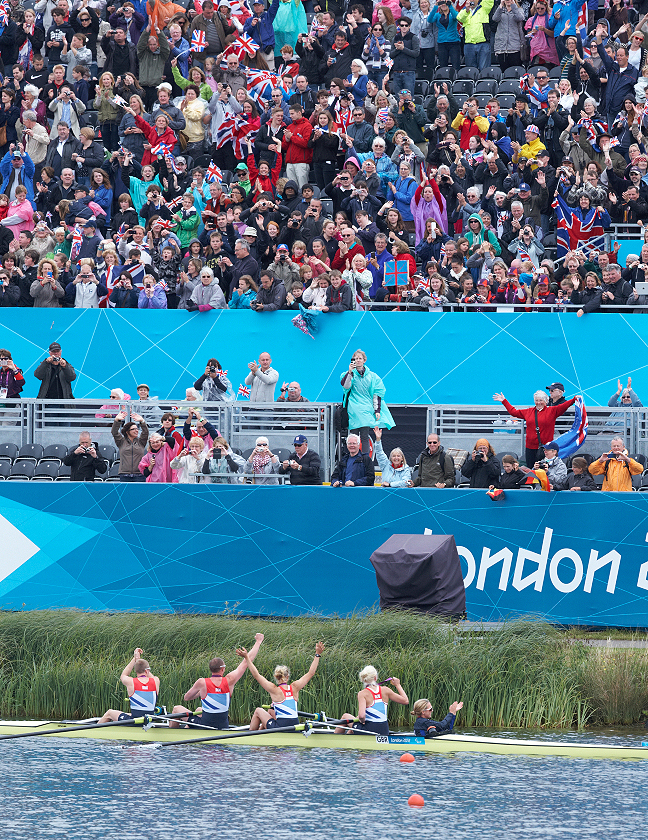
After the final we were whisked off to do interviews and media engagements. We had to get up really early the next morning to do a TV breakfast interview before moving into the main village. That evening, I met Rob (now my husband) out in a bar in London – he was competing for the USA in the PR2 category in rowing and had just beaten the GB boat for the bronze medal. Fast forward, nine years and we’re married, and have a baby.
London obviously had a massive impact on my life, but the thing that stands out for me is how much impact it had on the country and Great Britain’s acceptance and celebration of Paralympic sports and disability. It just had such a profound effect on the representation of disabled people.
Before 2012, the number of times that I got asked to go and do a speaking engagement, or a school talk was very, very small in comparison with after 2012. I think it has become accepted that Paralympic athletes are athletes, as opposed to disabled people who do sport. That’s the Paralympic legacy.
Personally, it helped me come to terms with having a disability. Before London, I knew that I was competing as a Para athlete, but I was still going through that journey of understanding my arthritis, and the damage it caused and learning to consider myself impaired. Competing besides athletes from all around the world with a huge range of disabilities and impairments helped me come to terms with my own disability.
We won gold with one of our worst races and that made me really hungry for more. I didn’t feel like I had done myself justice and knew I wanted to compete in Rio and show the world what I could do in one of my best races!”
Photos: Simon Way


